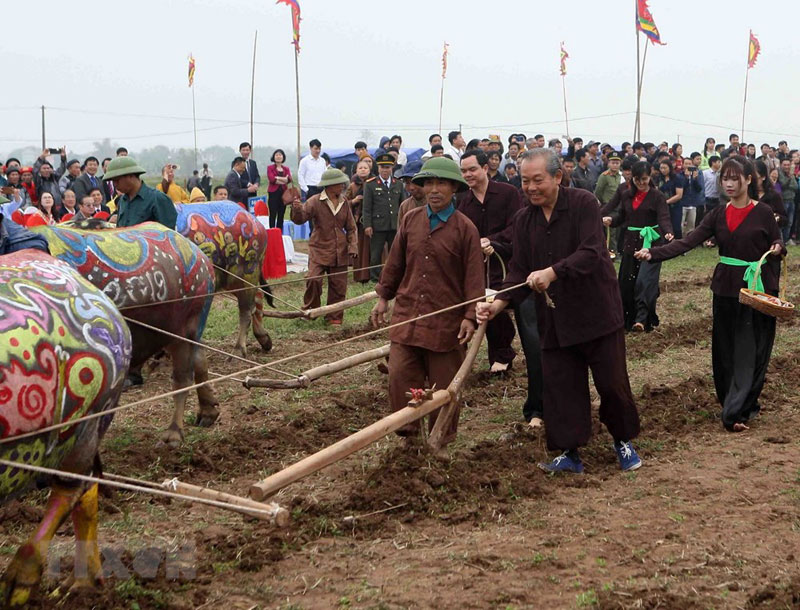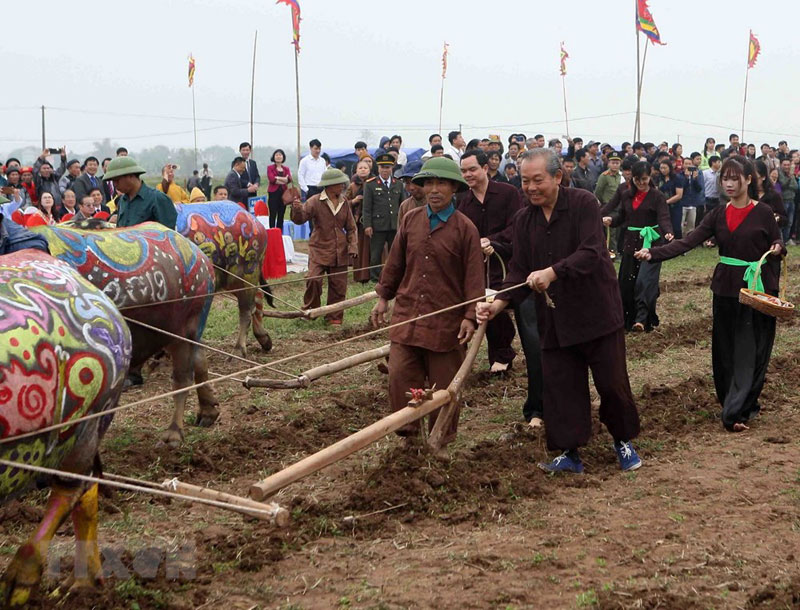
The traditional Tich dien (ploughing) festival was held in Doi Son commune of Duy Tien district, the northern province of Ha Nam, on February 11 to pray for bumper harvests and prosperity for all.
Deputy Prime Minister
Truong Hoa Binh (front, right) takes part in the ploughing ritual at the Tich
dien festival on February 11 (Photo: VNA)
Deputy Prime Minister Truong
Hoa Binh took part in the ploughing ritual at the event.
According to historical records, the first Tich dien ceremony of Vietnam was
organised at the foot of Doi Mountain by King Le Dai Hanh in the spring of 987.
This ceremony has become a tradition practiced in every spring since then.
The festival features the procession of the memorial tablet of King Le Dai Hanh
from Long Doi Son Pagoda to the foot of Doi Mountain, where it merges with the
processions of the local tutelary god and the founder of the Doi Tam drum
making craft. The joint procession then moves to the paddy area believed to be
the venue of the first Tich dien ceremony so as to carry out rituals praying to
the Agricultural God for bumper harvests and prosperity.
Addressing the event, Deputy Prime Minister Binh said the annual Tich dien
festival in Ha Nam province – part of the national intangible cultural heritage
– has become a highlight of the local culture.
He spoke highly of the restoration and organisation of this festival, noting
that this is a practical move to help preserve and uphold cultural values,
encourage agricultural and rural development, and popularise Vietnam’s image.
He noted with satisfaction that Vietnamese agriculture has made great strides
when its growth rate surpassed 3.7 percent in 2018 – a seven-year record high,
and the country has not only ensured its food security but also become one of
the 15 leading agricultural exporters in the world. Meanwhile, rural areas have
gained a facelift with over 42 percent of the total communes and 61
district-level localities recognised as new-style rural areas.
At the Tich dien festival, a number of cultural and sports activities were also
held, including drum performances, buffalo decoration, traditional wrestling
and tug of war.
On this occasion, the Ha Nam People’s Committee also presented new-style rural
area certificates to 13 communes in the province.
Source: VNA
The emulation movement "Hoa Binh joining hands to build new-style rural areas” has been widely spreading, becoming a driving force that motivates the localities to renew rural landscapes and improve the material and spiritual lives of the residents. In this movement, the people play a central role-both as the main implementers and direct beneficiaries of its outcomes.
In response to the global digital revolution, Hoa Binh Newspaper is transforming itself into a modern and multi-platform media hub, blending cutting-edge technology with a restructured newsroom and a new generation of tech-savvy journalists.
Hoa Binh province’s Association of the Elderly recently held a conference to review the project on expanding the inter-generation self-help club model until 2025.
In a move to implement Resolution No. 57-NQ/TW, issued on December 22, 2024 by the Politburo, which targets breakthroughs in science-technology development, innovation, and digital transformation, the Hoa Binh provincial Department of Health has issued a plan to roll out the "Digital Literacy for All” campaign within the local health sector.
An Nghia Commune (Lạc Sơn District) is one of the communes that achieved the tha standard of the national new rural area in 2018. Entering a new development phase, the commune is now trying to meet the criteria for the advanced new rural development. With the strong political will and the public consensus, the commune is gradually overcoming the challenges to reach this goal, aiming for the sustainable development.



